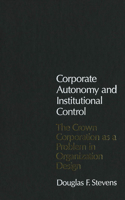
Corporate Autonomy and Institutional Control: The Crown Corporation As a Problem in Organization Design
Series: Canadian Public Administration
Stevens examines institutional frameworks for Crown corporations in Alberta, Saskatchewan, and Manitoba between the early 1970s and the mid 1980s, showing how each framework establishes different practices and offers distinct strategic advantages. Organizational approaches in Alberta most closely approximated what the author calls a self-contained design, in which corporate actors had the advantag
NaN
VOLUME
English
Hardback

Stevens examines institutional frameworks for Crown corporations in Alberta, Saskatchewan, and Manitoba between the early 1970s and the mid 1980s, showing how each framework establishes different practices and offers distinct strategic advantages. Organizational approaches in Alberta most closely approximated what the author calls a self-contained design, in which corporate actors had the advantage and were most able to achieve their own objectives. In Manitoba, where vertical information systems prevailed, central bureaucratic monitoring agents tended, to some extent, to wield influence over the corporations. Saskatchewan practice was akin to a lateral relations pattern, with an equilibrium between corporate and bureaucratic goals. Stevens's comparison of Crown corporation organization designs suggests that, while no one form is inherently more efficient than another, each leads to qualitatively different outcomes. He concludes that the most important issue in problems of organization design is who is winning the Crown corporation game -- a finding of considerable interest to all students of government enterprise.
Price Comparison [India]
In This Series
Bestseller Manga
Trending NEWS




















